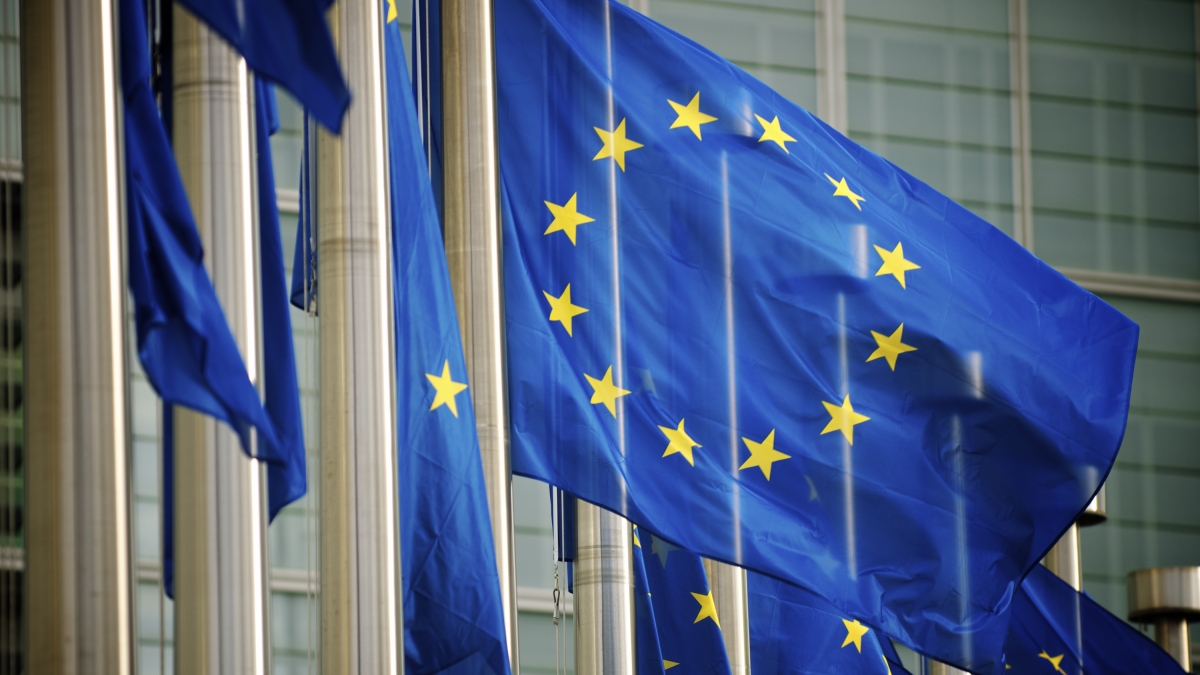Assassination attempt draws spotlight to European election season

The European flag. Photo by iStock/Getty Images
The assassination attempt on Slovak Prime Minister Robert Fico earlier this week put European politics on the front page of U.S. newspapers.
While most Americans likely weren't aware of who Fico is, the world’s attention is now focused on this small country that borders Ukraine and what this means for the region.
Fico remains in stable but serious condition, and an arrest has been made. Political leaders, including U.S. President Joe Biden, have expressed their solidarity with Slovakia and their horror at the shooting attack. With analysts predicting major changes in the European political landscape this summer, many are wondering what impact the attempt on Fico's life will have for his party, Slovakia and the European Union.
It’s complicated, and there are no easy answers. That’s why ASU News had Keith Brown and Anna Meyerrose break it down for us.
Brown is the director of ASU’s Melikian Center: Russian, Eurasian and East European Studies and a professor in the School of Politics and Global Studies, while Meyerrose serves as an assistant professor in the School of Politics and Global Studies.
The two took time to answer questions in a combined Q&A regarding this breaking scenario and its possible worldwide implications.
Question: Is this assassination attempt a one-off by a lone wolf or a sign of bigger tensions and problems across the continent?
Answer: Prime Minister Fico’s shooting came as a shock in Europe as well as in the United States. Part of the reason for that is that it comes three weeks ahead of elections for the European Parliament, in the midst of campaigns across all 27 member countries of the European Union. In all, 720 seats are at stake, and polls project that, this June, populist and nationalist parties will make significant gains. Several of these parties — including Fico’s — don’t agree with continued EU support for Ukraine, and many are advocating more restrictive policies on issues like media freedom and immigration. In their campaigning, they talk about restoring national-level pride and decision-making, and reducing the power of so-called Brussels elites and bureaucrats.
Q: Does this mean the European Parliament will become anti-European Union after June?
A: In the chamber of 720 representatives, there are six or seven “blocs” across the political spectrum, so it’s not a U.S.-style two-party system. In this next five-year mandate, it looks likely that these populist and nationalist parties will command more seats than ever before and shape the agenda. One issue that drives their success is the belief that the European Union’s turn toward environmentalist policies in the past five years has had a negative economic impact in some poorer countries. It looks like the Green parties who have advanced those policies will suffer major losses.
But overall, most EU citizens still recognize the advantages of EU membership — especially when they witness the effects of Brexit for the U.K. Most eurosceptics advocate changing the EU, rather than leaving it.
Q: This coming July, Hungary is scheduled to take over the rotating presidency of the European Union. What does this mean?
A: In July, Hungary will begin a six-month term as president of the Council of the European Union, which is made up of the elected leaders of the member states. The Council, along with the European Parliament, makes up the EU’s legislature. The presidency — which is sometimes referred to as the “president of the European Union” — has the authority to set the policy agenda and is responsible for facilitating conversations between different institutions within the EU.
Currently, Belgium holds the presidency, and identified and pursued six priorities broadly consistent with shared EU values. The rotation is set long in advance: With the current membership of 27 countries, each member state takes the role every 13 and a half years. The expectation is that the state holding the presidency sets aside their national interests and acts as an honest broker.
Q: Several EU member states have expressed concerns about Hungary’s presidency. Why is that?
A: First, and most basic, the EU is committed to promoting and protecting liberal democracy. And by many measures — including, for example, Freedom House’s ranking it only as “partially free” — Hungary is not a fully functioning democracy. Hungary began to shift away from democracy in 2010 when the center-right Fidesz party, led by Viktor Orban, first gained a majority in Parliament. Over the last 14 years, Orban and his government have taken extensive steps to undermine press freedom and judicial independence, and have eliminated a range of checks on executive power in Hungary. In February 2022 parliamentary elections, with a populist message, strong ties to business and near-total control of the media, Fidesz won 54% of the vote and now holds 135 of 199 seats, with Orban serving his fourth term as prime minister.
In response to this democratic erosion, the EU has repeatedly sanctioned Hungary and is currently withholding funding from Orban due to his violations of liberal democratic requirements — such as freedom of the press and rule of law — that the EU has for all its member states. The European Parliament even recently passed a resolution questioning whether Hungary should be allowed to hold the presidency at all.
This major clash in values is concerning in its own right. Many member states are also worried that Hungary will not act as a neutral leader but will exploit the presidency as an opportunity to change the EU from within and push for policies that align more closely with his ideology and with his vision for Europe. ... Orban has been building a relationship with President Putin’s Russia since 2010 and has opposed EU sanctions on Russia ever since Putin’s illegal annexation of Crimea in 2014. Earlier this year, he used Hungary’s 25-year membership of NATO to hold up the admission of Sweden to the alliance.
Q: Are these concerns justified?
A: Orban is a right-wing populist whose ideology relies heavily on nationalism and traditionalism. He’s also a smart operator: He knows that domestic support for EU membership remains quite high in Hungary, and also that Hungary is a net financial beneficiary in the EU. His most common talking points when criticizing the EU tend to focus on criticisms of the bureaucracy, migrants, green energy policy, LGBTQ rights and EU assistance to Ukraine in its war against Russia. Hungary instead advocates greater support for “the protection of European values and freedoms,” which Orban defines as nationalism, conservatism and Christian values. ... Not all of Europe’s right-wing populists are ready to abandon Ukraine — in Poland and Italy, for example, there is still clear recognition that Russian aggression poses an existential threat to European values. ...
(Orban) will also undoubtedly continue to push for greater sovereignty for individual countries, championing institutions and structures that transfer more power away from EU institutions and a “federal Brussels” and back to member state governments. In the new European Parliament after June, it looks likely that there will be new members who share that agenda.
More Local, national and global affairs

Thunderbird at ASU, AUK student appointed as Ukraine’s deputy minister of education and science
Nadiia Kuzmychova, a student in the Master of Leadership and Management (MLM) program at Thunderbird School of Global Management at Arizona State University and the American University…

ASU creates pathways to public service careers for military students
The School of Public Affairs at Arizona State University is making careers in public service easier to access for military students.Next year, the school will start holding graduate courses on site…

Minting community leaders and stellar citizens: ASU’s Public Service Academy approaches 10-year milestone
Airports that are easier to navigate.Health care that is simple to access.Helping underrepresented youth reach college.These are realities that alumni of Arizona State University’s Public Service…

